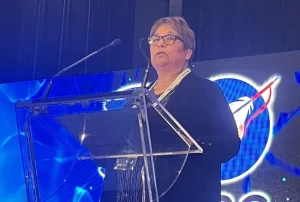Documentary featuring work combating climate impacts debuts at First Nations conference

By Sam Laskaris
NIAGARA FALLS – The world premiere of a documentary, which includes the work Sagamok Anishnawbek is doing to combat climate impacts, was held at a Niagara Falls conference, TechNations 2025 – Empowering Future Generations: 30 Years of Service and Innovation.
The 22-minute film, also featuring the efforts underway by Batchewana First Nation, was shown for the first time at the Ontario First Nations Technical Services Corporation (OFNTSC) conference.
The two-day conference, held at the Sheraton Fallsview Hotel, wrapped up on May 13. This marked the 30th year of the OFNTSC conference. The corporation, whose mission includes providing technical advisory services to First Nations throughout Ontario, was launched in 1995.
Details of the documentary were shared during the conference’s opening session, Bridging Generations: Sharing 30 Years of Knowledge and Experience on Asset Management and Climate Resilience.
Ernie Lickers, the OFNTSC’s senior asset management advisor who has been with the corporation since its inception, shared the initial details of the documentary during the first session of the conference following the opening ceremonies. The documentary was then shown in its entirety on the second day of the conference.
“It is probably the most important thing I have done in my entire career here with the OFNTSC,” Lickers said of the film.
Lickers said the documentary plays an important role.
“[It’s] making sure that our communities are part of the process and are utilizing the good tools that we as an organization are offering,” he said. “They’re making a difference in their community. But more importantly, their stories are heard and it’s documented.”
Lickers is among those in the film discussing the work that has taken place to battle the changes that various climates have brought to the two featured First Nations in the movie.
“I’m very, very excited to be a part of this,” he said.
Melissa Shawbonquit, an infrastructure specialist at Mamaweswen, also shared some information about the documentary.
Mamaweswen is the North Shore Tribal Council, which is comprised of seven First Nations, including Atikameksheng Anishnawbek, Shawbonquit’s First Nation. The two First Nations – Sagamok Anishnawbek and Batchewana – featured in the documentary are also part of the Council. And the others are Garden River First Nation, Thessalon First Nation, Serpent River First Nation, and Mississauga #8 First Nation.
“It was a great project to be working with them on this,” Shawbonquit said of the Sagamok Anishnawbek and Batchewana First Nations. “Part of that project was doing climate risk assessment for two of the communities.”
Shawbonquit has worked for the North Shore Tribal Council for the past 10 years. Besides delivering climate risk assessments for the First Nations in the Council, she also assists with the delivery of other services like asset management and maintenance management.
The documentary provided details on how climate change has affected buildings, roads, and houses, and the ensuing work that has been done to mitigate further damage.
Impacts that were being felt included water levels being heightened and flooding, wildfires, and damage to buildings, such as shingles being blown off roofs.
The OFNTSC provides technical advisory services to the 133 First Nations and 16 tribal councils in the province.


